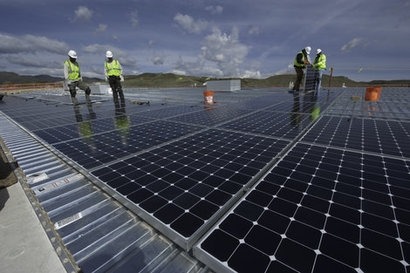
The Solar Trade Association (STA) has discovered that business rates on commercial rooftop solar installations will rise by between six and eight times as of April next year unless Ministers intervene. The change is coming due to a wider re-evaluation of business rates that takes place every five to seven years, where the Valuation Office Agency looks at how assets are valued, the income they generate and how costs have evolved over that period.
However, solar PV presents a particular challenge as a capital expenditure (capex) heavy technology where both costs and subsidies have dropped dramatically over the past five years. The issue is that the ‘rateable values’ that will come into force for rooftop solar as of next year bear little relation to the revenue generated by the installations but are instead based on fixed assumptions about capital costs of installation.
“This is a huge increase in the running costs of a rooftop solar installation that will affect both existing and new projects” said Paul Barwell, CEO of the STA. “In some cases, it would actually send installations into negative returns: you would be spending more on the system in tax and maintenance than you would be getting back from the sale of the power and the Feed-in Tariff support. We therefore need Ministers to step in as soon as possible. The system needs to recognise that solar is a unique technology with both costs and revenues having come down over the last five years. This has created a complete mis-fit with the business rates system that needs to be fixed, or else we will face a prohibitive tax hike in this sector.”
The rise in business rates does not affect domestic solar homes – only businesses that have solar on their roof, where they themselves own the system and installed it with a view to using most of the electricity themselves. Public authorities, schools and community buildings that have solar on their roofs are also at risk of being affected by this tax rise, although there are exemptions, for example some agricultural buildings as well as some small business exemptions.
This massive hike in business rates for commercial solar PV will come into force as of 1 April 2017, unless the Government intervenes between now and then. The Solar Trade Association has been in talks with the Valuation Office Agency and its equivalent bodies that administer business rates in devolved administrations, however the problem lies with the way business rates legislation is worded and therefore requires attention from government.
Mr Barwell added that even though this is a wholesale change in the methodology used to calculate business rates for solar when compared with the last seven years, the STA doesn’t think the hike is intentional. It is rather an accidental by-product of the established business rates system and how it applies to solar PV.
This is a complex issue. The STA believes the methodology shouldn’t be applied to solar rooftops in this way. It now intends to work with the three different government departments – Treasury, Communities and Local Government and Energy – to discuss its proposals to exempt self-owned rooftop solar from business rates altogether. The STA is urging Ministers to act immediately, otherwise this tax rise will all but eliminate the incentive for businesses to invest in solar.
For additional information:

